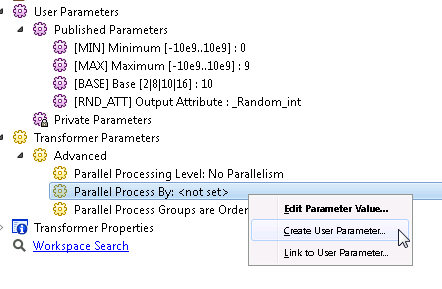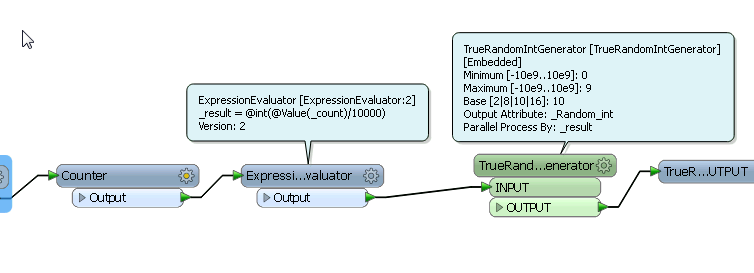I have a file with a huge number of feature (points) and I want to affect random values for them. I use the TrueRandomIntGenerator transformer to do that, but this transformer is limited (no more than 10000 feature). How can I do to handle the file by blocks of 10000 elements?
Solved
Generating large amounts of random numbers
Hello,
Best answer by geosander
It could actually handle more than 10,000 features (as there is no limit built-in to the transformer, it seems), but since the transformer uses a service called Random, that will cause the actual limitation. These limitations are mentioned in the link in the transformer's documentation.
The number of random integers you can generate depends entirely on the settings of the transformer. I just tried it out with 10,000 features, using base 10, 0 as minimum and 4,000,000 as maximum and I have now used up almost half my bit allowance (1,000,000 originally), so I could even run it again probably.
The problem here is you cannot fool that service (since it registers incoming requests by IP address), so you either need to:
- Wait until your bit allowance has been topped up (+200,000 daily);
- Divide your requests over different machines (each with their own IP - might need to have different (sub)networks too), although that probably is illegal if they find out;
- Buy credits on Random.org so you can make all the requests you need.
This post is closed to further activity.
It may be an old question, an answered question, an implemented idea, or a notification-only post.
Please check post dates before relying on any information in a question or answer.
For follow-up or related questions, please post a new question or idea.
If there is a genuine update to be made, please contact us and request that the post is reopened.
It may be an old question, an answered question, an implemented idea, or a notification-only post.
Please check post dates before relying on any information in a question or answer.
For follow-up or related questions, please post a new question or idea.
If there is a genuine update to be made, please contact us and request that the post is reopened.













